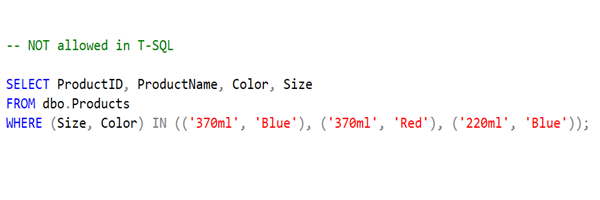SQL: Work arounds for multi-column IN queries in T-SQL

We all use IN when writing queries:
SELECT ProductID, ProductName, Color, Size
FROM dbo.Products
WHERE Size IN ('370ml', '220ml');
A challenge comes up though, when you want to find pairs of values using IN. For example, if I have the following pairs of values:
Size Color 370ml Blue 370ml Red 220ml Blue
How do I find those when using IN?
Other databases do allow you to have pairs:
SELECT ProductID, ProductName, Color, Size
FROM dbo.Products
WHERE (Size, Color)
IN (('370ml', 'Blue'), ('370ml', 'Red'), ('220ml', 'Blue'));
I wish T-SQL had that option but it doesn’t. It would be particularly useful when those values in the IN clause are coming from a sub-query.
Using CONCAT
One option is to use CONCAT to concatenate the strings. It takes a list of values, ignores NULL values, implicitly casts all values to strings, and concatenates the results.
SELECT ProductID, ProductName, Color, Size
FROM dbo.Products
WHERE CONCAT(Size, Color)
IN
(
CONCAT('370ml', 'Blue'),
CONCAT('370ml', 'Red'),
CONCAT('220ml', 'Blue')
);
That’s the solution that looks closer to what you were trying to achieve, but it does more work than needed.
Using VALUES and a join
The other way is to just create a table expression using row constructors and to then join to it:
SELECT p.ProductID, p.ProductName, p.Color, p.Size
FROM dbo.Products AS p
INNER JOIN
(
VALUES('370ml', 'Blue'), ('370ml', 'Red'), ('220ml', 'Blue')
) AS c(Size, Color)
ON c.Size = p.Size
AND c.Color = p.Color;
Using EXISTS
Tiago Rente reminded me in the comments on LinkedIn that of course we could have used EXISTS rather than an INNER JOIN. I actually prefer the EXISTS as it keeps the filtering in a single predicate. It could look like this:
SELECT p.ProductID, p.ProductName, p.Color, p.Size
FROM dbo.Products
WHERE EXISTS (SELECT 1 FROM
( VALUES('370ml', 'Blue'),
('370ml', 'Red'),
('220ml', 'Blue') ) AS Selected(Size, Color)
WHERE Selected.Size = p.Size
AND Selected.Color = p.Color);
Using a CTE for Clarity
Anthony Duguid also mentioned in the LinkedIn comments that he’d like a CTE in there, to allow for a clearer name for the subquery. In fact, I think I’d like the combination of a CTE and EXISTS the best:
WITH SelectedProducts
AS
(
SELECT Size, Color
FROM ( VALUES('370ml', 'Blue'),
('370ml', 'Red'),
('220ml', 'Blue')
) AS sp(Size, Color)
)
SELECT p.ProductID, p.ProductName, p.Color, p.Size
FROM dbo.Products
WHERE EXISTS (SELECT 1 FROM SelectedProducts AS sp
WHERE sp.Size = p.Size
AND sp.Color = p.Color);
2021-01-26
